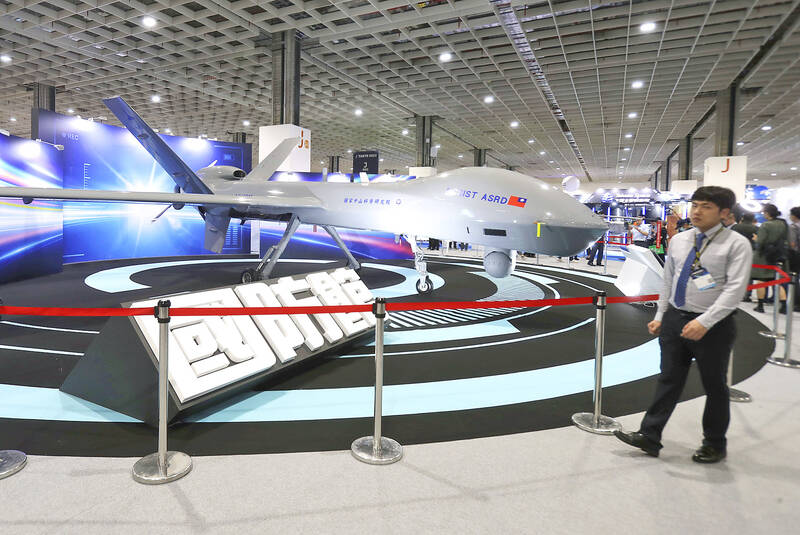After a four-year hiatus, the biennial Taiwan Aerospace & Defense Technology Expo (TADTE) opened yesterday in Taipei, with the US joining for the first time in four years.
The 16th edition of the show is the largest ever displayed, said the Taiwan External Trade Development Council (TAITRA), an organizer of the event. The expo is being held at the Taipei Nangang Exhibition Center’s Hall 1 until tomorrow.
It features about 280 exhibitors and 970 booths, along with numerous company representatives from 10 countries, TAITRA chairman James Huang (黃志芳) said.

PHOTO: AP
CEREMONY
At the opening ceremony, American Institute in Taiwan (AIT) Director Sandra Oudkirk congratulated the organizers on their historic participation in the biennial expo, which due to the COVID-19 pandemic had not been held since 2019.
“The strong turnout reflects the rapid development and growth of Taiwan’s aerospace and defense industry, as well as the growing international attention to trade and investment opportunities in the Taiwan market,” Oudkirk said in her opening remarks.
She said the AIT is hosting a pavilion at the show for the first time, in light of the two sides’ “long and robust history of partnership in the aerospace and defense sectors.”
The US features some of the biggest US industry leaders, including Lockheed Martin Corp, Northrop Grumman Corp, L3Harris Technologies Inc, Raytheon Co and BAE Systems Inc, Oudkirk said, adding that 41 small to medium-sized companies are showcasing their products.
The Prague-based Czech-Taiwanese Business Chamber, is also hosting a Czech pavilion at the three-day show for the first time, TAITRA said.
However, the main focus of this year’s exhibition, is the display by the Ministry of National Defense of more than 50 advanced weapon systems, including a new attack drone, a domestically developed jet trainer simulator and an exoskeleton suit.
SHOWCASE
The ministry’s pavilion aims to showcase the armed forces’ combat readiness, as well as reinforce self-defense awareness among Taiwanese, and boost their confidence in the nation’s military, Major General Lee Chien-ching (李健青) said at a pre-show news conference on Wednesday.
The pavilion is divided into five major areas featuring 54 items covering joint combat equipment, dual-use technology, uncrewed aerial vehicles and simulators, Lee said.
It features contributions from the US Army, Navy and Air Force, as well as the defense ministry’s Armament Bureau and the Chunshan Institute of Science and Technology, he said.
The expo is open to professional buyers on the first two days only, with the general public gaining free admission tomorrow, the organizers said.

Macronix International Co (旺宏), the world’s biggest NOR flash memory supplier, yesterday said it would spend NT$22 billion (US$699.1 million) on capacity expansion this year to increase its production of mid-to-low-density memory chips as the world’s major memorychip suppliers are phasing out the market. The company said its planned capital expenditures are about 11 times higher than the NT$1.8 billion it spent on new facilities and equipment last year. A majority of this year’s outlay would be allocated to step up capacity of multi-level cell (MLC) NAND flash memory chips, which are used in embedded multimedia cards (eMMC), a managed

CULPRITS: Factors that affected the slip included falling global crude oil prices, wait-and-see consumer attitudes due to US tariffs and a different Lunar New Year holiday schedule Taiwan’s retail sales ended a nine-year growth streak last year, slipping 0.2 percent from a year earlier as uncertainty over US tariff policies affected demand for durable goods, data released on Friday by the Ministry of Economic Affairs showed. Last year’s retail sales totaled NT$4.84 trillion (US$153.27 billion), down about NT$9.5 billion, or 0.2 percent, from 2024. Despite the decline, the figure was still the second-highest annual sales total on record. Ministry statistics department deputy head Chen Yu-fang (陳玉芳) said sales of cars, motorcycles and related products, which accounted for 17.4 percent of total retail rales last year, fell NT$68.1 billion, or

In the wake of strong global demand for AI applications, Taiwan’s export-oriented economy accelerated with the composite index of economic indicators flashing the first “red” light in December for one year, indicating the economy is in booming mode, the National Development Council (NDC) said yesterday. Moreover, the index of leading indicators, which gauges the potential state of the economy over the next six months, also moved higher in December amid growing optimism over the outlook, the NDC said. In December, the index of economic indicators rose one point from a month earlier to 38, at the lower end of the “red” light.

The global server market is expected to grow 12.8 percent annually this year, with artificial intelligence (AI) servers projected to account for 16.5 percent, driven by continued investment in AI infrastructure by major cloud service providers (CSPs), market researcher TrendForce Corp (集邦科技) said yesterday. Global AI server shipments this year are expected to increase 28 percent year-on-year to more than 2.7 million units, driven by sustained demand from CSPs and government sovereign cloud projects, TrendForce analyst Frank Kung (龔明德) told the Taipei Times. Demand for GPU-based AI servers, including Nvidia Corp’s GB and Vera Rubin rack systems, is expected to remain high,